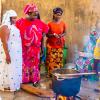
Options Magazine, Winter 2022: Transitioning to clean cooking services in South Africa can reduce existing health inequalities by improving the health of socially disadvantaged and marginalized groups.
In South Africa, access to clean cooking services and health impacts associated with using polluting fuels in inefficient cooking stoves are unequally distributed, with poor women often being disproportionately affected.
Previous studies on this topic have explored demographic health disparities, but not how other inequalities in a population can be linked to clean cooking technologies, because of the absence of a standard approach to measuring the health status of individuals.
In a study published in the journal Environmental Research Letters, Transformative Institutional and Social Solutions Research Group Leader, Shonali Pachauri, and her colleagues developed a new composite metric of individuals’ health status and used it to analyze the health impacts of future transitions to clean cooking services and climate mitigation futures in South Africa.
The study’s findings demonstrate that clean cooking can reduce existing health inequalities by gender, race, and education by improving the health of socially disadvantaged and marginalized groups who disproportionately rely on polluting cooking fuels and technologies.
“Our study shows that providing households with access to clean energy sources, such as electricity, is not enough to create improvements in health if reliance on polluting cooking technologies in homes persists,” explains Pachauri. “Therefore, in order to improve future population health outcomes, governments should accelerate the progress of the transition to clean cooking fuels and technologies while expanding household access to other clean energy sources.”
by Jeremy Summers
Publication
Aktas, A., Poblete Cazenave, M., & Pachauri, S. (2022). Quantifying the impacts of clean cooking transitions on future health-age trajectories in South Africa. Environmental Research Letters 17 (5) e055001. 10.1088/1748-9326/ac62ac.
